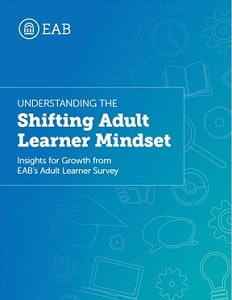In today’s higher education landscape, many colleges and universities are clamoring to attract adult learners and the dollars they bring to the bottom line. To gain insight into the mindsets of adult learners, education research firm EAB recently conducted a survey of current and prospective students attending or interested in undergraduate and graduate degree programs as well as certificate programs.
The report, “Understanding the Shifting Adult Learner Mindset: Insights for Growth from EAB’s Adult Learner Survey,” concludes that adult learners are savvy digital consumers when selecting an educational option.
The survey was conducted by EAB’s Enrollment Services and went to current and prospective adult learners in fall 2018, whose names were provided by institutions and entities that work with EAB—both traditional institutions and online programs. The results come from 772 participants. The institutions were not identified.
“What we were hearing from our clients and partners is around the fact that they needed a lot of help recruiting graduate students,” said Brittany Murchison, EAB’s managing director of program marketing. “They were looking for best practices and strategies.”
 Brittany Murchison
Brittany MurchisonMurchison noted this survey was designed to help understand the adult learner audience and give a data-driven sense of the motivations and desires of this population. The survey takes a broad view on adult learners, focusing on graduates, undergraduate degree completion, online and certificate programs.
Participating institutions were seeking additional information on the age, background, motivations, obstacles, mindsets and timelines of potential students. Murchison said the survey was designed to better understand the audience so institutions can develop more effective programming and marketing.
“We surveyed both traditional on-ground programs that would require being on campus, blended programs…and online programs,” said Murchison. “What the survey data would tell you is folks are very interested in a flexible, online option.”
One of the key findings of the report is that adult learners require a return on their education with 60.8 percent saying their decision to apply and enroll is driven by career or financial factors. Before enrolling, they want evidence that their investment in education will result in greater earning potential. Another key finding is that adult learners expect to find relevant, accessible information on a college or university’s website.
“We tried to be actionable in the survey, so [institutions] could have tactics to take away to use some of the insights in their marketing, recruitment efforts and program design,” said Murchison. “What it’s really taking away is the importance to design programs that fit the lifestyle of the adult learner, which is why the online component has been so huge.” 
Participating institutions are located in the Northeast, South, Midwest, West and outside of the U.S. The demographic information provided indicated that 67 percent of respondents identified as female, 32.4 percent as male and .6 percent as other. In terms of age, 13.9 percent were 25 or under, 40.9 percent 26-40 and 45.2 percent were 41 or over. African-American respondents made up 18.4 percent, Hispanic or Latino respondents 13.2 percent and white/Caucasian respondents 65.3 percent. Ethnicity-specific data was not presented.
Murchison declined to comment on possible divergence based on ethnicity, but did say, “I hope in future surveys that we can increase the diversity of the survey respondents.”
Other key findings were that adult learners are savvy in navigating the application process and wanted to see something clear and accessible. Time and response are a concern—both in terms of how long an institution takes to respond to questions and how long an applicant must wait to receive an approval on an application.
Cost and financial aid options play a significant role, with 39.6 percent of respondents saying that cost of attending is the top factor preventing them from enrolling and 41.6 percent saying they require some form of financial aid to attend.
“Adult learners are pragmatic, and I like to remind our partners that just because they apply to one school doesn’t mean they didn’t evaluate 10,” said Murchison. “A lot of adults are making sure they truly understand all of their options.
“Prospective students are doing a lot of research on [school] websites,” she added. “Institutions need to ask themselves how they are supporting that student journey and are they doing that in an effective enough way. If information is hard to find, people will go elsewhere. Make sure online components are there to facilitate that student journey.”
The final key finding is that adult learners require flexible options so they can partake of their education while also continuing work and honoring family commitments. Flexibility includes online, part-time and hybrid programming.
“This survey provides the data on the trends they’ve already been seeing,” said Murchison. “Use that data to go back to their institutions and advocate for the right programs and offerings for potential students.”















